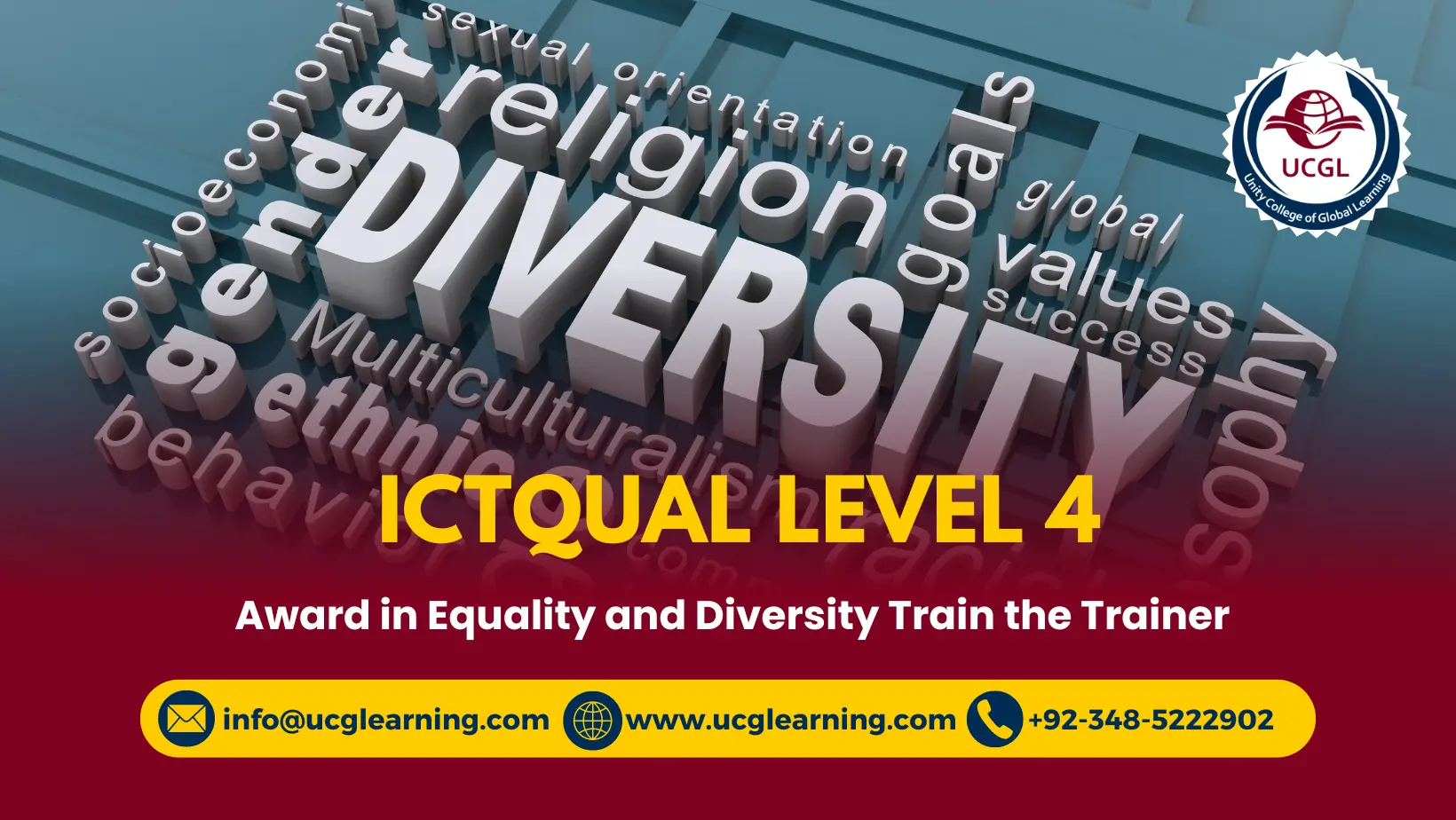ICTQual Level 4 Award in Equality and Diversity Train the Trainer
In today’s globalized and multicultural society, fostering equality and diversity in the workplace is not just a legal requirement but a moral imperative. The ICTQual Level 4 Award in Equality and Diversity Train the Trainer offers a comprehensive and structured approach to equipping individuals with the knowledge, skills, and confidence needed to become proficient trainers in promoting equality and diversity.
Course Introduction
In today’s diverse and interconnected world, fostering an inclusive environment where everyone feels valued and respected is essential for creating a thriving and harmonious workplace. This course provides a structured framework for participants to explore key concepts, legislation, and best practices related to equality and diversity, and learn how to effectively deliver training sessions that promote understanding, empathy, and acceptance.
Course Benefits:
- Expertise Development: Participants gain in-depth knowledge of equality and diversity legislation, principles, and best practices, enhancing their expertise in promoting inclusivity.
- Trainer Proficiency: The course hones participants’ training skills, enabling them to deliver engaging, effective, and culturally sensitive diversity training sessions.
- Organizational Impact: Organizations benefit from having trained professionals who can foster a culture of equality, diversity, and inclusion, leading to enhanced employee morale, engagement, and performance.
Course Study Units:
- Introduction to Equality and Diversity Training
- Legislation and Policies
- Unconscious Bias and Stereotypes
- Cultural Competence and Sensitivity
- Addressing Discrimination and Harassment
- Inclusive Leadership and Organizational Culture
- Designing and Delivering Equality and Diversity Training
- Facilitation Skills and Techniques
- Assessing Learning Outcomes and Providing Feedback
- Continuous Professional Development and Improvement
Learning Outcomes:
Introduction to Equality and Diversity Training:
- Understand the importance of equality and diversity training in fostering inclusive workplaces and communities.
- Recognize the benefits of promoting equality and diversity for individuals, organizations, and society as a whole.
- Identify key concepts and principles of equality and diversity training, including equity, diversity, inclusion, and social justice.
- Appreciate the role of trainers in creating safe, respectful, and welcoming environments for all individuals.
Legislation and Policies:
- Familiarize with relevant equality and diversity legislation, regulations, and policies at national, regional, and organizational levels.
- Understand the legal obligations of employers, employees, and other stakeholders in ensuring equality, diversity, and inclusion in the workplace.
- Identify discriminatory practices and behaviors prohibited by law and organizational policies.
- Learn how to interpret and apply legislation and policies to address discrimination, harassment, and inequality effectively.
Unconscious Bias and Stereotypes:
- Develop awareness of unconscious bias and its impact on decision-making, behavior, and interpersonal interactions.
- Recognize common stereotypes and prejudices that contribute to bias and discrimination in various contexts.
- Understand the psychological mechanisms underlying unconscious bias and its implications for diversity and inclusion efforts.
- Learn strategies and techniques for mitigating unconscious bias and fostering a more inclusive and equitable environment.
Cultural Competence and Sensitivity:
- Gain cultural competence and sensitivity to effectively engage with individuals from diverse backgrounds, cultures, and identities.
- Understand the dynamics of culture, ethnicity, religion, language, and other identity factors in shaping individuals’ experiences and perspectives.
- Learn how to navigate cultural differences and bridge communication gaps in multicultural environments.
- Develop skills for promoting cross-cultural understanding, empathy, and respect in interpersonal interactions and organizational practices.
Addressing Discrimination and Harassment:
- Identify different forms of discrimination and harassment, including direct, indirect, systemic, and intersectional discrimination.
- Understand the impact of discrimination and harassment on individuals’ well-being, performance, and sense of belonging.
- Learn strategies for preventing, addressing, and resolving discrimination and harassment incidents in the workplace.
- Develop skills for supporting victims, confronting perpetrators, and creating a culture of accountability and respect.
Inclusive Leadership and Organizational Culture:
- Recognize the role of leaders in fostering inclusive organizational cultures and promoting diversity and inclusion initiatives.
- Understand the characteristics and behaviors of inclusive leaders, such as empathy, authenticity, and commitment to equity.
- Learn how to champion diversity and inclusion efforts within teams, departments, and organizations.
- Identify strategies for embedding diversity and inclusion principles into organizational policies, practices, and decision-making processes.
Designing and Delivering Equality and Diversity Training:
- Develop skills in designing comprehensive equality and diversity training programs that address organizational needs and objectives.
- Learn how to set clear training objectives, identify learning outcomes, and develop relevant content and materials.
- Explore different training delivery methods, techniques, and resources for engaging learners and promoting active participation.
- Gain proficiency in delivering dynamic, interactive, and inclusive training sessions that cater to diverse learning styles and preferences.
Facilitation Skills and Techniques:
- Master a range of facilitation skills and techniques for creating a positive and inclusive learning environment.
- Develop effective communication, active listening, and questioning skills to encourage open dialogue and participation.
- Learn how to manage group dynamics, handle challenging behaviors, and maintain a respectful and supportive atmosphere.
- Gain confidence in facilitating discussions, activities, and exercises that promote reflection, empathy, and understanding.
Assessing Learning Outcomes and Providing Feedback:
- Understand the importance of assessing learning outcomes to measure the effectiveness of equality and diversity training.
- Learn how to develop assessment tools and methods, such as quizzes, surveys, observations, and case studies.
- Develop skills in providing constructive feedback to learners to enhance their understanding, skills, and attitudes.
- Gain proficiency in evaluating training effectiveness and identifying areas for improvement in training delivery and content.
Continuous Professional Development and Improvement:
- Recognize the value of lifelong learning and continuous professional development in promoting personal and organizational growth.
- Identify opportunities for expanding knowledge, skills, and expertise in the field of equality and diversity training.
- Develop a personalized professional development plan to enhance effectiveness as a trainer and advocate for equality and diversity.
- Commit to staying informed about emerging trends, best practices, and innovations in equality and diversity training through networking, research, and participation in professional development activities.
Who is This Course For?
- HR Professionals: HR managers and specialists involved in diversity and inclusion initiatives who want to develop or enhance their training skills.
- Diversity and Inclusion Practitioners: Professionals dedicated to promoting diversity and inclusion in the workplace who want to become proficient trainers.
- Trainers and Training Managers: Professionals responsible for designing, delivering, or managing diversity training programs within organizations.
- Business Owners and Managers: Leaders committed to creating diverse and inclusive workplaces who want to empower their teams with training skills.
Future Progression for This Course:
Upon completion of the ICTQual Level 4 Award in Equality and Diversity Train the Trainer, participants may pursue further qualifications or career advancement opportunities, such as:
- Higher-level qualifications in diversity and inclusion management or related fields.
- Specialization in specific areas of diversity training, such as gender equality, LGBTQ+ inclusion, or disability awareness.
- Opportunities to become certified trainers for accredited diversity and inclusion courses, expanding their professional reach and impact.
ICTQual Level 4 Award in Equality and Diversity Train the Trainer is a valuable investment for individuals passionate about promoting equality, diversity, and inclusion in the workplace. By completing this course, participants not only enhance their own professional development but also play a crucial role in building more equitable, diverse, and inclusive organizations for the future.







